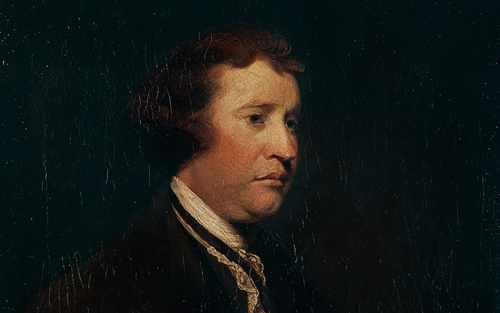
Your complimentary articles
You’ve read one of your four complimentary articles for this month.
You can read four articles free per month. To have complete access to the thousands of philosophy articles on this site, please
Philosophical Haiku
Edmund Burke (1729-1797)
by Terence Green
Past, present, future
Woven seamlessly as one,
Dread Reason’s hubris.

Edmund Burke was born in Dublin to a Catholic mother and a Protestant father. It is tempting to think that this was the source of Burke’s lasting distaste for discord and his commitment to social order, but there is no evidence to suggest that religious differences were ever a cause of tension in the Burke household. Although he was a member of the British House of Commons for nearly twenty-nine years, it was rather as an observer of politics and as one of the greatest prose stylists of his age that Burke made his name. Temperamentally cautious, he was never addled by the optimism that befogged the minds of so many in the eighteenth century. He was, in fact, scathing of the Enlightenment assumption that we can create a better world through reason. Indeed, he said the very idea that we might fashion society according to abstract notions of justice, right and good is nothing more than ignorance coupled with arrogance. This was the principal theme in his Reflections on the Revolution in France (1790): that the orgy of bloodletting and destruction that followed in the wake of that revolution was inevitable once we took it upon ourselves to create a brave new world. Society is not held together, he said, by the rational self-interest of its members. Rather, a cosy feeling of belonging keeps the bonds of society strong. And the society to which we belong comprises not merely those living today, it includes our blessed dead, as well as those yet to be born. This is an organic view of society, a view that rejects the liberal notion of society as a mere collection of individuals who happen by chance to live in the same neighbourhood. Instead, society is an organism, and we are its many constituent parts. Individually we cannot be understood other than as a part of our society, Burke said. Think about it this way (Burke didn’t say this, but I’m sure he’d agree): How much sense would an elephant’s trunk make if you removed it from the elephant? Exactly!
© Terence Green 2016
Terence is a peripatetic (though not Peripatetic) writer, historian and lecturer. He holds a PhD in the history of political thought from Columbia University, NYC, and lives with his wife and their dog in Wellington, NZ. He blogs at hardlysurprised.blogspot.co.nz.









